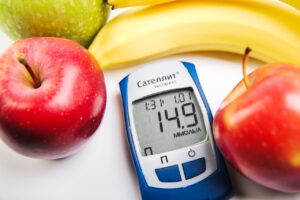You don’t have to be diabetic to deal with blood sugar swings. In fact, unstable glucose levels might be behind your energy crashes, cravings, and even anxiety.
Blood Sugar 101
Your body runs on glucose, and when it swings too high or too low, things get chaotic. After a carb-heavy meal, you might feel great—then crash an hour later.
Common Symptoms of a Crash
- Shakiness or lightheadedness
- Sudden hunger (especially for sugar)
- Irritability or mood dips
- Brain fog
- Fatigue
Why It Matters for Chronic Health
Even mild blood sugar rollercoasters can contribute to inflammation, hormone imbalances, and fatigue. Over time, they raise your risk for insulin resistance and type 2 diabetes.
What to Do
- Eat balanced meals: Combine carbs with protein, fat, and fiber.
- Cut back on sugar and white carbs
- Don’t skip meals: Going too long without food can trigger crashes.
- Walk after eating: A short stroll helps regulate glucose levels.
Testing for Glucose Issues
Ask your doctor about:
- Fasting glucose
- A1C levels
- CGM (continuous glucose monitor) for real-time tracking
You can also use at-home finger-prick monitors to spot patterns.
The Takeaway
If you feel like you’re on an emotional or energy rollercoaster, blood sugar may be to blame. Small tweaks can help you feel way more stable.
Top Weight Loss Programs

Remedy Meds

Medvi

Hims

ShedRX









